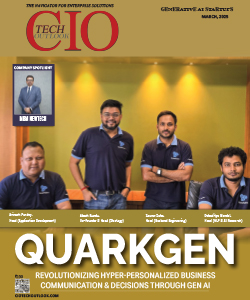Malaysia Digital Investments Boost ASEAN's Tech Hub Role
CIOTech Outlook Team
Saturday, 03 May, 2025
TCS, IBM Join Hands to Build India’s Quantum Future in Andhra Pradesh
CIOTech Outlook Team
Friday, 02 May, 2025
Web3 & Digital Assets Markets Awards 2025 Winners Announced by The Technology Express Magazine
CIOTechOutlook Team
Friday, 02 May, 2025
Cognizant CEO: Future Tech to Be Driven by Machines Writing Code
CIOTech Outlook Team
Friday, 02 May, 2025
Revealed: The Winners of UAE Realty Awards 2025 by Finance World Magazine
CIOTechOutlook Team
Friday, 02 May, 2025
Korean Researchers Create Flexible Ultrasonic Receiver for Wireless Charging
CIOTech Outlook Team
Friday, 02 May, 2025
AI-Powered Chip Enhances Heart Attack Detection with 92.4% Accuracy
CIOTech Outlook Team
Thursday, 01 May, 2025
AI now generates over 30% of Microsoft’s code: CEO Satya Nadella
CIOTech Outlook Team
Thursday, 01 May, 2025
Toyota and Waymo Collaborate to Boost Autonomous Driving Technologies
CIOTech Outlook Team
Thursday, 01 May, 2025
Proterra's New Battery Technology Targets Heavy-Duty Commercial Vehicles
CIOTech Outlook Team
Wednesday, 30 April, 2025













